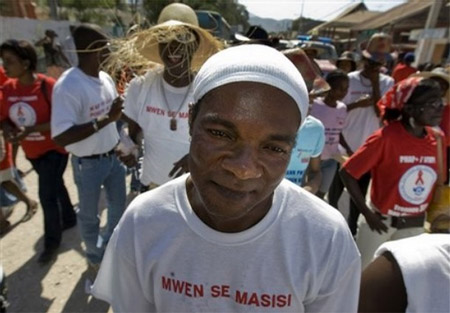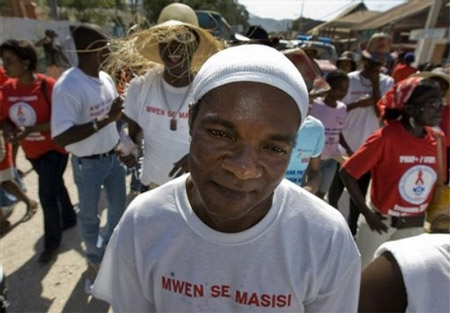Understanding the Rights of the Marginalized: Haiti’s LGBT Community
Posted OnFebruary 13, 2012 by

Haiti held its first ‘openly gay march’ on November 30, 2008. This participant’s shirt reads, in English, “I am gay.”
By Carly James
In the wake of the second anniversary of Haiti’s 2010 earthquake, much of the world is directing its attention to the social, economic, and political progress that Haiti has made. Since that historic moment in Haiti’s troubled history, considerable strides have been made in terms of rubble removal, medical assistance, and resettlement of displaced persons. In fact, the country was proud to inaugurate the ultra-modern Roi Henri Christophe University, currently one of Haiti’s largest buildings, in mid-January.
Secretary of State Hilary Clinton’s plea for legitimizing sexual orientation as a basic human right in December 2011 has inflated interest around the world concerning what proactive measures the Obama administration has taken to promote this message across the globe. Furthermore, people are looking inward to their own states to understand what opinions and interests exist with regard to promoting LGBT rights.
In Haiti, like in many other places, the popular perception, political stance, and religious understanding of homosexuality are interconnected and puzzling all the same. Haitian Voudou, the hybridized religion based on West African traditions, Roman Catholic practices, and indigenous West Indies spiritual beliefs, is an inextricable part of much of Haitian daily life. On matters of sexual orientations and gender expression, Voudou does not explicitly promote or deny any practices. Not only does Voudou have a relatively open attitude toward LGBT rights, but it also maintains an undefined moral position on issues of homosexuality. The pairing of Voudou’s deep-rooted influence in Haitian social life and the strong Roman Catholic sway among Haiti’s political leadership in the recent past, however, has muddled Haitian popular perception of the LGBT community. It seems that most LGBT Haitians are still struggling to understand their social niche. Without a distinguishable presence in Port-au-Prince and other populous areas, the LGBT community has yet to be fully recognized within Haitian social life. Educated, upper-middle class LGBT Haitians are visible in Pétionville, an area in the hills where private LGBT gatherings can be comfortably held. For most LGBT Haitians, however, daily acceptance remains much more of a struggle.
While consensual homosexual relationships (the legal age of consent is 18) have been legal since 1986, few protections and provisions have otherwise been made for homosexual couples in Haiti. Issues of adoption, civil unions and marriages, and recognition of homosexuality within the military are all rather unclear.
Constitutionally, LGBT Haitians are technically protected against discrimination in the workplace (Article 35-2). Members of the LGBT community openly hold positions as government officials, NGO workers, etc. Outside of the workplace, however, LGBT Haitians have been known to struggle with discrimination and negative stigmatization. It is not uncommon for madivins (lesbians) and masisis (gay males) to receive hateful remarks when seen in public, especially if cross-dressing is involved. AIDS is another piece of the LGBT puzzle in Haiti, as this disease is still frighteningly prevalent in the country. Stigmas connecting homosexuality and AIDS are unfortunately present in Haiti, and efforts to fight discrimination may never be successful until this important issue is addressed.
Whatever prejudices may exist, it is clear that the LGBT community is not unlike any other in desiring its voice to be heard and its needs to be met. In 2002, Anthropologist Anne Lescot drew attention to these issues in her award-winning documentary Des Hommes et Dieux. Furthermore, years before the earthquake, Haiti proudly held its first “openly gay march” in November 2008. International attention is on Haiti as it is engrossed in a large-scale reconstruction process, and perhaps the issue of LGBT rights is among the many which will undergo an important transformation within the next decade.
Sources:
http://www.un.org/News/Press/docs/2012/sgsm14053.doc.htm
http://www.bilerico.com/2011/02/haitian_vodou_and_the_acceptance_of_lgbtq_identiti.php
http://www.der.org/films/of-men-and-gods.html
http://www.towleroad.com/2008/12/haiti-holds-fir.html
